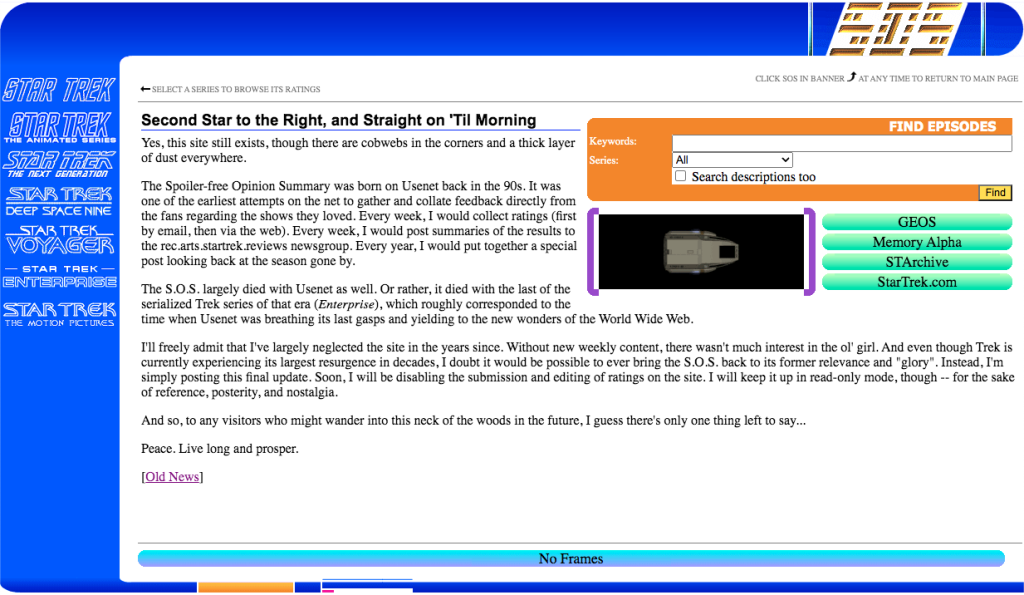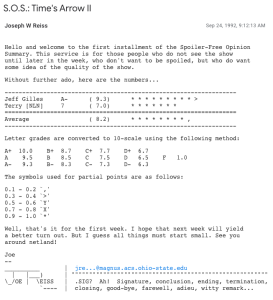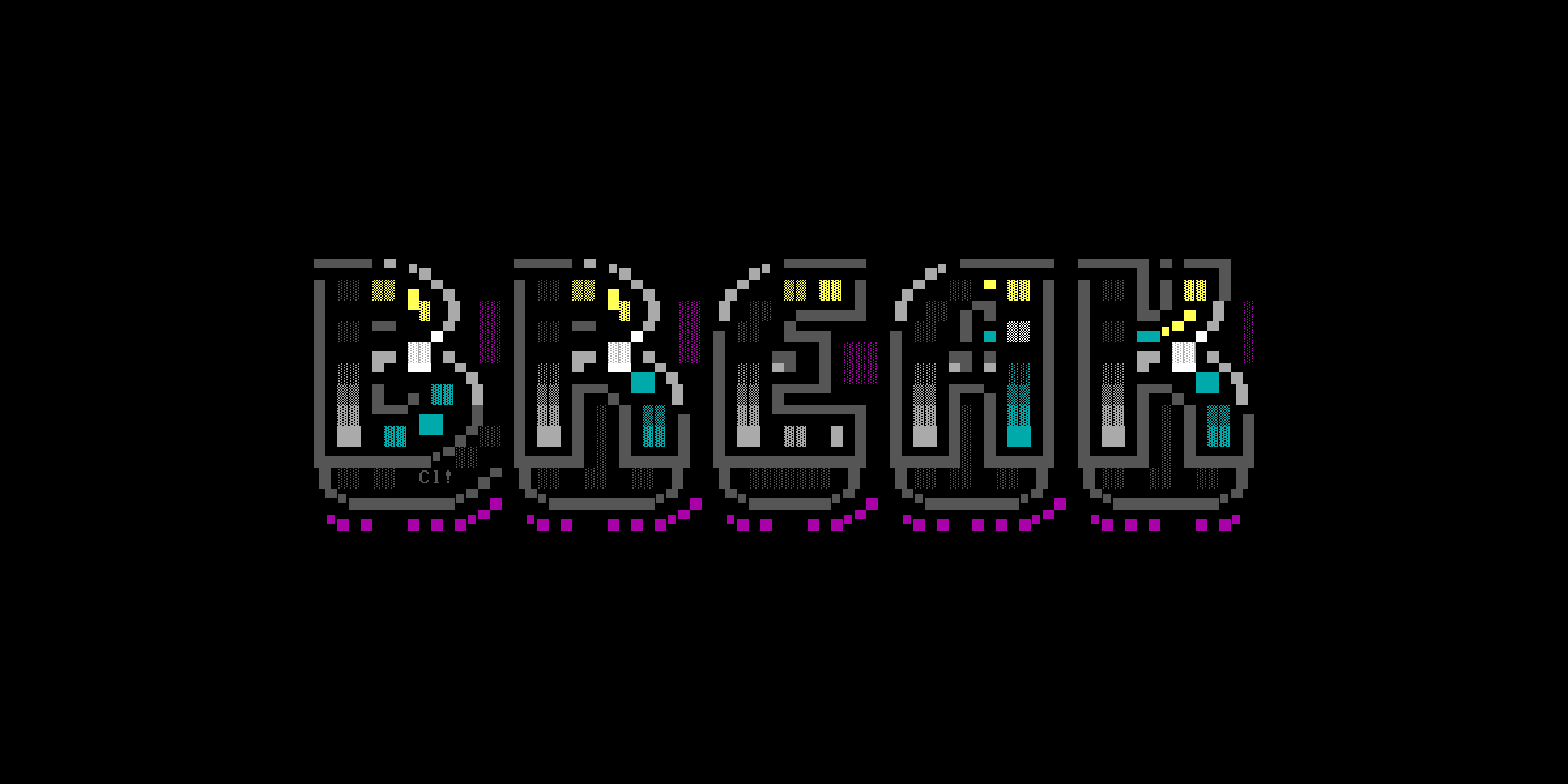
Today, Sept. 24, is the 30th anniversary of the launch of the Spoiler-Free Opinion Summary. The S.O.S. was a crowd-sourced ratings database, born in the early 1990s, which deserves to be remembered. I wrote this blog post to celebrate the anniversary. Also, don’t miss my interview with Joe Reiss.
For most folks in 1992, if you wanted to know if a TV show was any good, you needed to have the right issue of TV Guide at the house, or the right edition of the newspaper. There was no IMDB, no Rotten Tomatoes. Not yet.
But if you were a college student, a professor, a tech-savvy hobbyist, or the lucky kid of someone like that, then maybe you had access to Usenet and its array of newsgroups.
Each newsgroup was like a messageboard dedicated to a topic: fans of Atari’s 16-bit ST computers would post messages in comp.sys.atari.st. If you were a Star Trek fan, you might hang out in rec.arts.startrek.current. It likely will not surprise you to learn I frequented both those newsgroups.
Like me, Joe Reiss was a Trek fan, and in the fall of 1992, he decided to solve a problem at the intersection of syndicated television and Usenet.

The premiere of the sixth season of “Star Trek: The Next Generation” was drawing near. Unlike the original “Star Trek,” which had been broadcast at a fixed time nationwide by the NBC network, “The Next Generation” was syndicated — sold directly to local television stations who could air the program any time they wanted on any day of the week.
When the show got underway, rec.arts.startrek.current was sure to be full of fans debating each new episode. But woe to those who lived in a market where “TNG” aired late in the week, doomed day after day to dodge spoilers from those lucky ones who saw the show on Mondays.
Reiss’ solution? The Spoiler-Free Opinion Summary. Here’s how he pitched it to the group on Sept. 16, 1992:
I said that I would like to establish a weekly feature on this newsgroup. If all the reviewers who catch the new episodes early in the week would be kind enough to e-mail me simple numerical or A-F ratings of the shows, with no spoilers or other comments, I’d be more than willing to type these up nice and pretty and post them, along with an average, so people who don’t get to see the episode until later in the week but who don’t like spoilers can still get some idea of the quality of episode they can expect. I know I’d be interested myself, since my hometown station doesn’t show the new episodes until 11am on Sun.
So, to all you early bird reviewers… Whaddaya say? I’m game if you are!
The next week, on Sept. 24, Reiss posted the first installment of the S.O.S., covering the premiere episode, “Time’s Arrow, Part II.” Only two people submitted ratings: one gave it a 9.3 rating and the other gave a 7, for an average of 8.2. It was, perhaps, an inauspicious start. But the S.O.S. would grow.

Early on, Reiss developed a twice-a-week schedule. He’d make a first post with early scores on Thursday for the benefit of those unlucky late-in-the-week viewers, then a second post on Sunday with all the final ratings for posterity.
Two episodes after the debut of the S.O.S., Reiss received five submissions for “Man of the People.” Among those submitting were Tim Lynch and Jason Snell. Neither apparently enjoyed the episode: Lynch gave it a 3, and Snell a 5.5.
Today, Snell is tech writer, editor, and podcaster. But back then, he was a kid seeking people who shared his interests.
“I’m not sure I had any friends in high school who liked Star Trek, so finding the Internet in college was a godsend,” Snell told me by email. “We were one of the first generations to have that experience, which of course is now completely common — everyone’s on the Internet.”
Like Snell, I remember being excited when I got access to Usenet and found likeminded people … people with whom I then proceeded to argue, often with messages of great length. When I discovered the S.O.S., I loved how it gave me a different outlet for my opinions, a way to cast my vote with a number.

As for Lynch, he had made a name for himself in the rec.arts.startrek.* newsgroups with his insightful weekly episode reviews of “The Next Generation” since 1989. He went on to review “Deep Space Nine”, which is when I began following him, as well as “Voyager” and “Enterprise.” His work resonated with readers — and even caught the attention of Trek staff writers and artists. Decades later, Ars Technica would hail him as a pioneer of modern TV criticism.
“I always made it a point never to look at the S.O.S. until after I’d finished my own review,” Lynch told me by email, “because I didn’t want to have my opinion biased by knowing those results.”
“Once I’d posted the review, though, the S.O.S. was always a really interesting way to get a ‘sense of the room’ for a particular episode,” he said. “It let me see, among other things, whether I could anticipate strong agreement or strong DISagreement with my own ratings.”
In my case, the “DS9” episode “Crossfire” seems to have prompted such a disagreement. Lynch scored it a 5.0 in the S.O.S., while I gave it a 9.0.
In a 1996 message entitled To Mr. T. Lynch, I tried to defend the “Odo/Kira Romance Thing,” and explained how I felt “Crossfire” was a “terrifically tragic” episode that had left me “heartbroken.” Gotta love teenagers!
Star Trek was just great fodder. For reviews. For ratings. For ribbing each other.
The S.O.S. “always made for a good conversation starter,” Lynch told me. “And on Usenet, where conversation was the point, that was invaluable!”
In the four years after Reiss started the S.O.S., it grew significantly. In February 1996 he told the newsgroup that the number of unique ratings had surpassed 30,000, with 10,000 of those coming in the past three months.
“I never expected the S.O.S. to become this big,” he wrote then. “But everyone seems to be enjoying it, myself included.”
Other grass-roots data-gathering efforts were gaining steam on Usenet at this time, too. The most notable was the Internet Movie Database, which began in 1990 as the “rec.arts.movies movie database.” It moved to the web in 1993, and became “IMDb” in 1996.
The S.O.S. didn’t quite reach IMDb’s heights, but it similarly made the jump to the web around 1995, finding a home at joereiss.net/sos/, where it has lived for decades with a framed HTML design that mimicked the “LCARS” computer interface design from “TNG.” The S.O.S. ultimately grew to include ratings for all the series and movies, plus a few other shows.

“What I’m struck by, in thinking about those days, is that we were basically trying to build the web before the web got started,” Snell told me. “Clearly all the ideas were there — the S.O.S. is essentially the forerunner of a web forum poll or even an IMDB or Rotten Tomatoes user rating system!”
“The people who built the early web were all the sort of people doing this on newsgroups, so I think it’s really where they got the inspiration for what was to come,” he said.
Reiss has kept the S.O.S. online all these years, and it remains a useful resource even today, for people who remember that it’s there. I’ve been using it recently to pick “TNG” episodes to watch with my kids. Also, the original Usenet posts can still be found by searching Google Groups, though the whitespace used to format the ratings in ASCII has been stripped out.
The S.O.S. was and is a fantastic repository of honest fan feedback, gathered by one man with a passion.
“Please, send me your opinions,” Reiss wrote 30 years ago. “It’s free, and you’ll make a college junior … very happy.”

Share your thoughts!